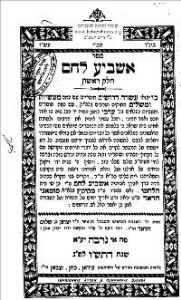A Short Tribute
Hacham Mekiketz (Gutza) Israel Haddad was born to Janina and to Shumani, Hacham Nissim Haddad's grandson, in Djerba. He studied Torah with Hacham Rachamim Hai Hayuta Hacohen, who also ordained him as a shochet and bodeq, and received a permanent stipend from Hayuta and Azizi, sons of Reuven Cohen Lemdjerbi. Hacham Mekiketz (Gutza) Israel was also a mohel, cantor and preacher. He eventually served as a dayan and halakhic adjudicator in Tatouine.
Hacham Mekiketz Israel Haddad married Yaakuta, daughter of Ruth, who died at the very young age of 22. He remarried, taking Hannah, daughter of Zion Houri, as his wife.
His father died at a young age, in 1943, after much suffering.
Hacham Mekiketz (Gutza) Haddad immigrated to Israel and served as Rabbi of the Beit Hagedi moshav in the Negev. He passed away on the 11th of Tishrei 5740 (1980). His published work includes Ko'akh Le'Hai, Asbi'a Lechem, and Sha'agat Arieh.
A few quotes from the Rabbi on 'Traditions of the Fathers' in which he teaches to avoid quarreling with one's wife, for it ruins one's children's upbringing
Yose ben Yochanan, man of Jerusalem, standing guard at the gate, says "May your home be open wide" – to permit individuals of Torah and good attributes to enter, from whom your children may learn Torah and proper behavior. Just as we see in pious people, who seek to bring Torah scholars into their homes, that they may teach their children Torah and good attributes.
You should consider always them as though they are the "poor of your household", devoid of Torah learning and lacking in proper behavior, and needy of a master and teacher to lead and instruct them.
The text concludes: "Do not overindulge in conversation with the woman". This is connected and relates to what precedes, as we clarified above, concerning the good upbringing of children, in that the father and mother should be at peace, love and union, and heed one another.
…Therefore, after referring to good upbringing - that one's "home be open wide", so as to have people of Torah and good attributes enter there and so that one's children will learn from them and receive a good upbringing - it [the text] recounts yet another useful principle in the upbringing of children: not to "overindulge in conversation with the woman". This means that even when noticing a detail in the way one's spouse does things at home that is not to one's liking, one is to ignore it and, as a rule, avoid quarreling about it with one's spouse which would be at the expense of domestic peace. Doing so ruins children's upbringing, in that they will learn to act similarly and not heed their mother or father.
Asbi'ah Lehem, p.19, 'Idan Press Publishing, Cohen and Sabban, Djerba, 1945
